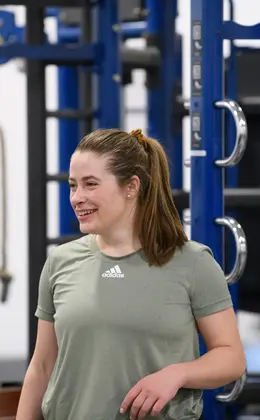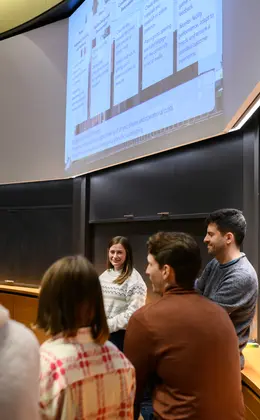A Day in the Life: Emma Herlinger ’24
We spent a day with Emma Herlinger ’24, a student in the Master of Advanced Management program, as she crossed the Yale campus for class, exercise, and meetups with friends.



My morning starts at the gym with my friend Juan. Juan used to be a competitive powerlifter, so I have an excellent coach. My days tend to fill up quickly, and it’s important to me to make sure that I’m taking care of my body and my mind despite a crazy schedule—so I go early to make sure I get it done. The gym is also a little quieter at that time, and I like to get started with my day early. But our workouts end up taking a lot longer than they need to because we tend to chat and goof around.
Payne Whitney Gym is lovely. It’s huge – I still don’t know how to use half the equipment in there. The staff is always really warm and welcoming, even at six a.m.
Walking back from the gym is a nice, calm way to start to my day. It often feels like a little walking meditation. I love to watch the seasons change on my walk through campus, and it’s a great 15 minutes of “calm before the storm” of my day ahead.
On my walk home, I pass by Ingalls Rink. I’ve been to a few games there—at a women’s hockey game a few weeks ago I started chatting with a man who’d been a season ticket holder for 25 years. He told me all about the history and architecture of the rink, which was super interesting.






My first class of the day is a class that I’m a teaching assistant for, called Social Innovation Starter with Teresa Chahine at the Jackson School of Global Affairs. In this class, students are grouped into teams to consult with small social enterprises from around the world.
One team is working with an organization that’s helping refugees find jobs in the United Kingdom. Another is supporting youth affected by climate change in different parts of Africa. I support each of the teams. My role is less about technical expertise and more about supporting the teams in tapping into what they intuit from conversations with the client and various stakeholders, and guiding them in turning what they learn into a viable solution to offer to the client.
Each of the students brings such a rich background of work and life experience. There are many students from Jackson and SOM, a few from the School of the Environment, as well as a few undergrads. The teams comprise such a wide variety of experiences, perspectives and academic disciplines, which makes what they can offer to partner organizations incredibly rich and meaningful.
The relationships I’ve formed through this course have opened so many doors for me here at Yale. My co-TA, Chris, who is at the Divinity School and has become a very close friend, organizes a yoga class that takes place in the chapel every Wednesday morning. It’s the best way to start my Wednesdays, and I get to meet and practice with folks from across many of the different schools.
After class, I zip over to the Center for Business and the Environment to conduct a Zoom interview for an independent study that I’m doing called the Regenerative Agriculture Lab.
I’m working with two teammates from the School of the Environment to consult with a large wheat producer in Mexico. Our job is to interview key stakeholders, including the farmers who supply their wheat products, to learn more about how they implement sustainable and regenerative agriculture practices throughout their supply chain.
Regenerative agriculture is a tricky concept in that it doesn’t have one concrete definition. However, industry leaders are recognizing the importance of adopting regenerative agriculture practices and the need to define what regenerative agriculture means on a company-by-company basis. So our goal is to take all of the knowledge and information that we gain from these interviews and consolidate it into one collective definition and a manifesto that allows for forward movement not only as a company, but as a full supply chain.
On that day, I was interviewing a farmer in Arkansas about his regenerative practices. Often stakeholders use different language and definitions to describe how they implement regenerative practices, so our job is to “translate” these different languages into one common definition that resonates with all stakeholders.



After the interview, I walk over to SOM for a quick lunch before class. I love to cook, so I bring lunch to school most days—that day was spicy cauliflower and chickpea stew—and sit with my friends in Charley’s Place. It’s fun to just show up and see who’s there. It’s a different combination of friends every time.
Next is our Global Leadership class, one of our MAM required courses. The course is project-based wherein teams explore potential use cases for English Station, an abandoned power plant in New Haven. Here we’re presenting our proposal, which is to turn the site into a recreational space and paintball facility.
This is one of only two classes that we have together as an MAM cohort, so it’s nice to get to work together. I also appreciate the real-world application of these leadership concepts. In our first core class for the MAM curriculum, we focused on tenets of leadership and interpersonal dynamics from more of an academic perspective. I appreciate that the project-based nature of the course allows us to practically apply the idea of being engaged local and global citizens.




I don’t actually drink much caffeine, but my Thursdays are long days. So between classes I pop down to McNay Café with my friend Pablo to grab a matcha. It’s a good excuse to stretch our legs and get a little oxygen flowing. I love the café and the staff there. Oli is especially sweet. On one of my first days of school, I’d had a really long day and was in desperate need of a snack. I started chatting with Oli, and she could tell that I’d had a long day and gave me a free piece of chocolate chip pumpkin bread—one of my favorites. I always enjoy chatting with her, and the café is just a nice little quiet corner to go study or have a coffee chat.
My last class of the day is Judy Chevalier’s Modern Philanthropy class. Because my background is in philanthropy, I’ve really enjoyed exploring alternatives to the traditional philanthropic model that perpetuates inequity in a lot of ways. Judy and Paige MacLean bring in many guest speakers who have introduced us to the different forms that philanthropy can take, and ways that it can center the voices of innovators and leaders who are proximate to the problems that philanthropy endeavors to solve.
Modern Philanthropy is another example of a class with students from such varied backgrounds. There are quite a few students from the David Geffen School of Drama and many students from SOM with backgrounds in social impact, so it’s incredibly valuable to be able to learn from them as well as from Judy and Paige, who are exceptional teachers, and from speakers with so much industry knowledge. I’m just learning from all angles in this class.
One of my favorite parts of the MAM program is that I’m able to hand pick such specific classes. When I got my MBA, the curriculum was primarily comprised of core business classes. So at SOM I’ve appreciated getting to home in on specific interest areas through courses like Modern Philanthropy and Robert Jensen’s Insurance and Finance for the Poor, which is another of my favorite classes.
I’m definitely tired by the end of this long day. In the last photo, I think Roshni and I are celebrating that we’re done with the week.




